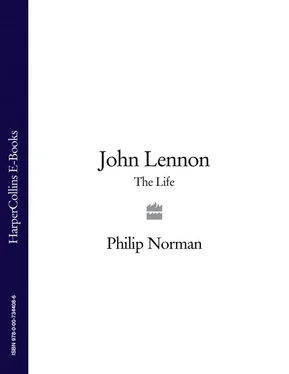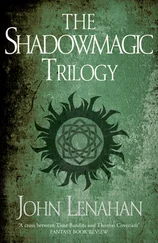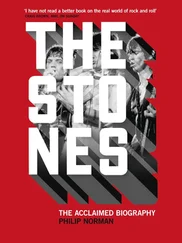John was away in Scotland with Aunt Mater and Uncle Bert, and knew nothing of what had happened until his return home a couple of days later. As Mimi would remember, ‘He came bouncing in, his usual excitable self, and asked where George was. When I told him he was dead [ John] just went very quiet. He didn’t cry or anything like that. He just went up to his room. If there was any crying to do, he would do it on his own. He wouldn’t want anyone else to see him like that.’
The family member thought best suited to keep John company at such a devastating moment was his Aunt Harrie’s daughter, Liela. She remembers arriving at Mendips to find Mimi ‘sitting outside on the coal-bunker, looking lost.’ Alone in his bedroom with this trusted childhood ally, John could at last give vent to his emotions, which he did not do by crying but by cackling with uncontrollable laughter. ‘We both had hysterics,’ he later remembered (though Liela has no recollection of joining in). ‘We laughed and laughed. I felt very guilty afterwards.’
George’s death had a devastating effect on Mimi, made worse, perhaps, by recollecting how little overt affection she had shown him in return for his generosity, good nature and ever-dependable kindness. ‘Our world was never the same,’ she would remember. ‘John took it on the chin…but never the same. The place seemed empty, but we muddled on. I mean, you don’t give up, do you?’
George had never been much of a businessman and—so the family always maintained—had been denied his fair share of the Smith dairy farm when his brother Frank sold it for development in the latter war years. Mimi thus found herself left with little in the way of capital to continue educating and providing for John and maintaining the comfortable home to which he was accustomed. She did not discuss these financial anxieties with him, and he never dreamed that at least once a year she discreetly visited a pawnbrokers in Smithdown Road and pawned her diamond engagement ring.
In that era, a woman widowed in her early fifties was expected to regard her life as over. Although Mimi was only just over forty, the thought of remarriage—or any other relationship with a man—never crossed her mind. From here on, so she thought, her only raison d’être would be the care and protection of John.
Her main support were the four sisters whose lives and families remained as closely meshed as ever. And ironically, the one she turned to most frequently for consolation was Julia, the ‘baby sister’ whose unreliability she had so often deplored. Though Mimi still could not bring herself to accept Bobby Dykins, she formed a closer bond with Julia than had existed since their childhood; henceforth a day seldom passed when Julia did not drop in at Mendips for a cup of tea and a chat.
Coping singlehandedly with 14-year-old John was a task that required all Mimi’s old hospital-bred toughness as well as her bottomless reserves of diligence and self-sacrifice. He was always to remain in awe of her flights of temper, when she would pick up anything at hand and fling it at him, regardless of consequences. Rather than provoke her ire over neglected homework or unsuitable friends, he often preferred to tiptoe noiselessly out of the house on stockinged feet; for the rest of his life, he would retain this habit of padding around as noiselessly as a cat. But more often than not, just as he reached the back door and liberty, a stern voice from above would call, ‘Is that you, John?’
The lack of a man about the house was accentuated by John’s inability to perform even the simplest domestic tasks. When his two small cousins, Michael and David, arrived for a visit, Mimi would give them the many overdue little jobs that were beyond him. ‘I remember often changing the light-bulb in John’s bedroom,’ Michael Cadwallader says. ‘He’d never even learned to do that.’
Mimi’s straitened finances increased her reliance on her student boarders. Fortunately, Michael Fishwick was now preparing for a biochemistry PhD and so needed accommodation for most of the year rather than just a regular student’s three terms. He was allotted the back bedroom Mimi had formerly shared with George, while she moved into the larger bay-windowed one adjoining John’s. Considering Fishwick an old friend, as well as a link with George, she took to confiding in him as she seldom had in anyone outside the immediate family. When she visited a solicitor to probate George’s will, she asked Fishwick to accompany her, and also recounted the circumstances that had brought John into her care. Once she even showed him a letter from John’s father, Alf, sent from prison, which all these years later still ‘made steam come out of her ears’.
The loss of George’s kindly, understanding masculine influence could not have come at an unluckier time, with John poised on the edge of adolescence and clamouring for information, advice and reassurance. Sex education did not feature on Quarry Bank’s syllabus, and Mimi could not be interrogated on such matters in other than the most general and theoretical terms. Like most of his generation, John had to piece together the facts of life from dirty jokes and diagrams on the walls of public urinals.
It was still almost universally believed that masturbation called down the same heavenly wrath as the Old Testament’s Onan suffered for ’letting his seed fall on the ground’. Boys who wanked, tossed off, beat their meat, pulled their wire or gave themselves a hand-shandy did so at the supposed risk of going blind, growing hair on their palms or being permanently shut away in psychiatric institutions. As a Boy Scout, John had been bombarded with such warnings via Baden-Powell’s Scouting for Boys manual, with its puzzling metaphors about rutting stags and its advocacy of fresh air and exercise to stave off any inclination to ‘beastliness’.
He became a dedicated wanker, undeterred by any fear of heavenly retribution and, as always, in company with his arch-crony, Pete Shotton. It was a further symbol of their closeness, without any suggestion of the homoerotic; they wanked together as an act of Shennon-Lotton rebellion, defiance and mutual showing off. John proved to have a particular aptitude and near-inexhaustible stamina. Once, he accepted Pete’s challenge to do it ten times in a single day, the prize being unlimited access to the Shotton family’s television set. He failed to reach this target, but only by one go.
The wider circle of Lennon followers would also sociably wank all together, stimulating themselves and their neighbours by shouting out the names of sex goddesses like Sophia Loren or Gina Lollobrigida. Sometimes at the critical moment, John would call out ‘Winston Churchill’ or ‘Frank Sinatra,’ and the onanists would collapse into giggles.
As if there were not enough going on in 1955 already, the nation’s wankers were presented with a riveting alternative to ‘tit’ magazines like Spick and Razzle. Twenty-one-year-old Brigitte Bardot, already well known to French cinemagoers, made her first English-language film, Doctor at Sea , and changed every preconception of sexuality on the big screen. Whereas conventional Hollywood sirens like Ava Gardner or Lana Turner were remote, untouchable and curiously ageless, Bardot seemed hardly more than a schoolgirl with her startled-doe eyes and dimpled chin, as dewily innocent as she was knowingly voluptuous. Her very nickname, ‘the sex kitten’, was almost enough to bring her overheated young admirers to spontaneous orgasm. John became obsessed by her, cutting her picture from a magazine and pasting it to the ceiling above his bed.
He was by now intensely aware of the strong sexual atmosphere between his mother and ‘Twitchy’ Dykins at 1 Blomfield Road. Once, as he would always remember, he accidentally walked into their bedroom while Julia was fellating Dykins, half-covered by a sheet. As his hormones began to run riot, he also became increasingly conscious of Julia’s physical allure, the more so as she had always treated him in a jokey, flirtatious manner, more like a sportive young aunt. One afternoon when he was playing truant from Quarry Bank as usual, he lay on her bed next to her as she took an afternoon rest. He never forgot what she was wearing: ‘a black Angora short-sleeved round-necked sweater, not too fluffy, maybe it was that other stuff, Cashmere, soft wool anyway, and, I believe, that tight dark green and yellow mottled skirt’. As they lay there, he accidentally touched Julia’s breast, ‘and I was wondering if I should do anything else. It was a strange moment because at the time I had the hots, as they say, for a rather lower-class female who lived on the opposite side of the road. I always think I should have done it. Presumably she would have allowed it.’
Читать дальше












![John Bruce - The Lettsomian Lectures on Diseases and Disorders of the Heart and Arteries in Middle and Advanced Life [1900-1901]](/books/749387/john-bruce-the-lettsomian-lectures-on-diseases-and-disorders-of-the-heart-and-arteries-in-middle-and-advanced-life-1900-1901-thumb.webp)